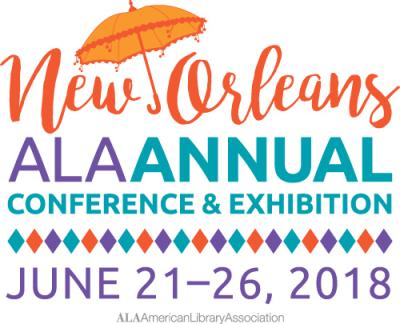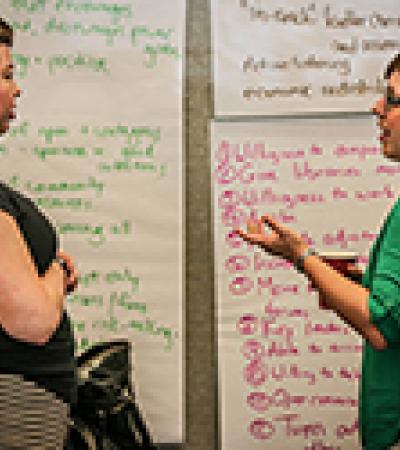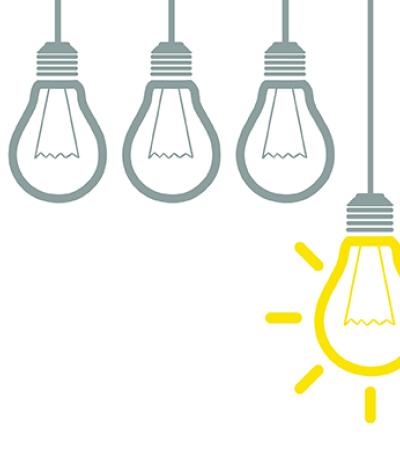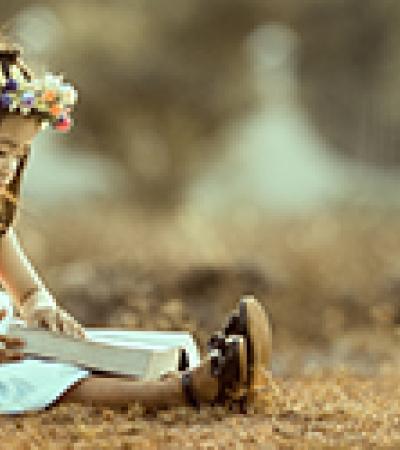The American Library Association (ALA) recently held its annual conference in New Orleans. As expected, the food was fantastic, the people of New Orleans were amazingly welcoming and the content of the conference was spectacular. We spent several days soaking up ideas for programming, learning about new authors and networking with our fellow librarians.
Arriving home from hot and steamy NOLA, brimming with new programming ideas for our libraries, it seemed like a natural idea to share them on this blog. With so many great ideas floating around we each picked our top three to share, in no particular order.

Donna’s picks
- “Understanding Teens 101: Stereotypes, Biology and Why You Should Bother”: As the title suggests, this session focused on the neuroscience of teens, preconceived notions of teens, unrecognized microaggressions and — of course — tips for working with teens.
In this session, a panel of three young adult services librarians from Arapahoe Libraries (Colo.) began by showcasing preconceived stereotypes of librarians, then transitioned to highlighting preconceived stereotypes of teens. It was a perfect way to begin what can be a difficult conversation. A favorite analogy from the session was when they compared a teen to a toddler at story time. In the analogy they pointed out that the toddler did not arrive at story time thinking, Today I plan to have a bad day and I plan to ruin everyone else's day." The same can be applied to teens: the teen does not necessarily arrive in your library planning to have a bad day.
Tips for interactions with teens included: 1) Build relationships. Say hello, learn their names. 2) See them. Compliment their outfit. 3) Teens need sleep. Remember that most teens are functioning on a sleep deficit. 4) Be aware of microaggressions. We walked away from this session with a plethora of resources to assist any teen library program.
- “Branding Your Library: Reinventing the Library Image”: In this session school librarians Suzy Ferrell, Tania Castillo and Taniko Brown (School Library Journal’s 2017 School Librarian of the Year) — all from the Clear Creek ISD (Texas) — presented on marketing and branding your library.
Interestingly the session started with “old school” images of libraries and librarians: the stereotypes. We were encouraged to make a list of what we wanted to market. What is our mission? What message do we want to convey about our library? As we considered our brand, we were told to focus on a clear, meaningful and unique message, and to use tools like Microsoft Publisher or Canva to bring our library’s brand to life. A great programming idea that came for this session was to have student contests to create your brand. Finally, use social media to market all you do.
- “High Impact Librarianship: A Showcase of Collaborative and Experiential Learning Initiatives”: In this session a panel of librarians and professors from Grand Valley State University (Mich.) presented on their collaborative experiences. We love the fact that the research conversations that librarians, professors and students have at the university level are the same conversations that we engage in at the high school.
Many great programing ideas were shared in this session. A favorite was a collaborative project where students create or rewrite an Open Educational Resource (OER) and publish or republish with creative commons licensing. Librarians can then create a research guide that will point students and faculty to the quality freely accessible resources. This is a great librarian, teacher and student collaboration.
Other collaborative partnerships included having graphic design students create a visual glossary for a select list of information literacy terminology. Another fun programming idea was to make a Heads Up! game with information literacy terminology. All these programming ideas can be adapted to fit in the school library.
Jen’s picks
- “Kids Listen: Podcasts Amplify Engagement and Learning”: This panel session introduced the world of podcasting for kids. The panelists included Anne Bensfield of Oak Park Library (Ill.), Pamela Rogers of the podcast Buttons & Figs, Molly Bloom from the podcast Brains On from API, Kitty Felde from the Book Club for Kids podcast and Jose Rodriguez, an educator from the Los Angeles Unified School District (Calif).
Programming with podcasts can really capture the interest of children. Because kids are naturally curious, listing to kid-friendly podcasts in your library can be a great way to assist with forming new knowledge and allowing kids to listen to research. Sharing a science podcast in your programming and then choosing books to share in a display is a great way to integrate the audio and the literacy together. Creating podcasts is another great programming idea that was picked up from this session! There are so many easy and free tools to create podcasts. (That’s an entirely separate blog post that we will write soon.)
- “Reads Like Fiction: Nonfiction You Can’t Put Down”: This session focused on books that are non-fiction but read like fiction. One of the creative programming ideas that came out of this session: pairing fiction and nonfiction texts and creating book talks from the two. Author Anne Boyd Rioux shared her book “Meg, Jo, Beth, Amy: The Story of Little Women and Why It Still Matters.” Pairing a book talk about Louisa May Alcott’s “Little Women” with a book talk about Ms. Rioux’s book will spark interest in a classic.
Nicole Chung shared from her upcoming memoir “All You Can Ever Know,” which is her story of her adoption and growing up Asian American in a predominately white town. Think of the possibilities of fiction texts you could pair to create fiction and nonfiction book talk programming!
- “Fake News and Free Speech: Is There a Right to Be Misinformed?”: Oh, the programming possibilities from this session ... they are endless. Moderator James LaRue (director, ALA Office for Intellectual Freedom) led panelists Nicole Cooke (University of Illinois), Damaso Reyes (The New York Literacy Project), Mary Minnow (Institute of Museum and Library Services) and Joyce Valenza (Rutgers University) through a discussion on the importance of teaching information literacy, understanding bias and choosing civility.
Programming ideas include working with the lesson plans and curriculum ideas from The News Literacy Project, the Newseum and Common Sense Media to assist in helping students and patrons make great decisions about staying informed.
In New Orleans we learned of a local custom of giving “a little bit extra," based on the Creole word lagniappe. To leave you with a little bit extra, check out the American Association of School Librarians (AASL) lists of best websites and best apps for 2018. These sites and apps have endless potential for programming ideas in your library.



